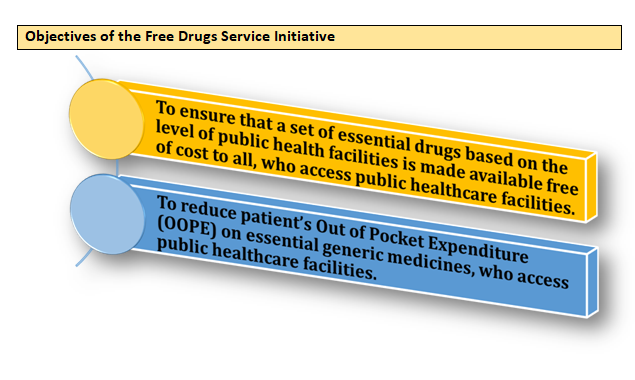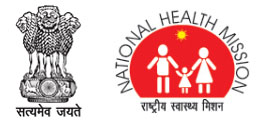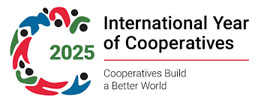National Free Drugs Service Initiative
In India, most patients seeking treatment for acute or chronic diseases were facing a silent crisis in access to essential drugs. India has some of the highest Out of Pocket Expenses (OOPE) when it comes to healthcare, drugs constitute over 67% of out-of-pocket expense on healthcare (NSSO 68th round).
If quality essential drugs are provided free of cost to all patients visiting public health facilities, it would bring significant saving to the patients. Hence, the provision of free drugs has one of the most important intervention towards mitigating the burden of healthcare cost. Sustainable Development Goals to achieve universal health coverage can be attained via. safe, effective, quality and affordable essential generic medicines.
Ministry of Health & Family welfare, Govt. of India has recognized the importance of essential drugs being available and accessible at public healthcare facilities. So, in 2015, the “Free Drugs Service Initiative” (FDSI) has been launched under the National Health Mission (NHM). Operational Guidelines and Model RFPs for implementing the initiative were established and shared with the states along with the budget announcement. The guidelines emphasis on procurement of generic essential medicines at low prices, eliminating irrational medicines and unscientific fixed dose combinations.

Components of FDSI
Under the initiative, support is being provided for provision of free essential medicines at public health facilities. For its effective implementation, there are various components which includes
- Procurement
- Warehousing
- IT System for supply Chain Management
- Quality Assurance
- Dissemination of Standard Treatment Guidelines
- Prescription Audit
- IEC & Training
- Grievance Redressal
| NHSRC Support to the MOHFW |
National Health Systems Resource Centre (NHSRC) provides technical support to the Ministry of Health and Family Welfare (MoHFW) for effective implementation of initiative in the states.
Key activities conducted by NHSRC- QI under FDSI:
- Revision and development of facility wise Essential Medicines List*
- Development & implementation Prescription Audit guidelines
- Development of Drug warehouse guidelines
- States Program Implementation Plans (PIPs) appraisals etc.
*ESSENTIAL MEDICINES LIST (EML) |
|
It is important to emphasise the use of EML in the procurement of high-quality medicines, as well as regular supply, price control and strengthening the healthcare system. To improve the credibility of the health-care system, routine and widespread access to essential medicines must be ensured |
|
Essential Medicines List is critical to the initiative's success. In 2016, the Ministry of Health and Family Welfare (MoHFW) developed a facility wise Essential Medicines List and shared it with the states, based on the NLEM. The essential medicines list for PHC and HSC was also developed in 2020, after the launch of Ayushman Bharat -HWC. |
Essential Medicines List --- Facility wise |
|
|---|---|
| Level of Health Facility | Total number of medicines |
| Health & Wellness centre, Sub centre | 105 |
| Health & Wellness centre, Primary Health Care (PHC) | 172 |
| Sub centre | 57 |
| Primary Health Care | 285 |
| Community Health Centre (CHC) | 455 |
| District Hospital (DH) | 544 |


